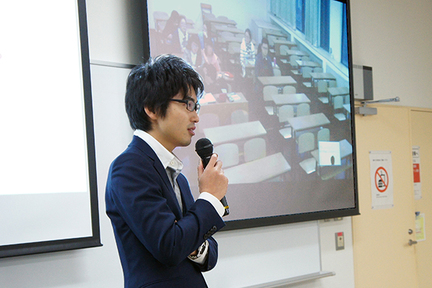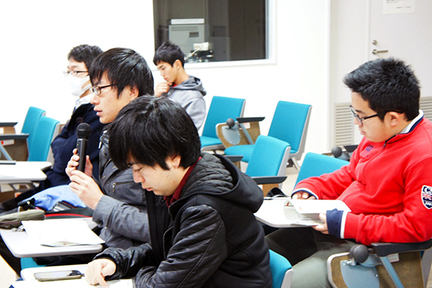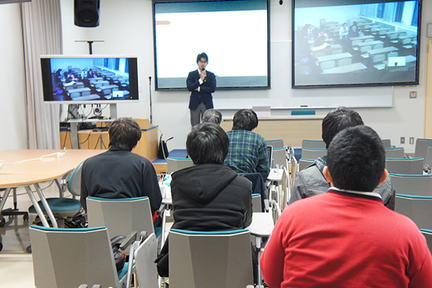I Want to Learn How to Think Beyond Academic Disciplines
Vol.9 2014.12.10 Nakagami, Gojiro
Support for Old People who Live in Bed: Care for Excretion
As long as we live, we need to take in nutrition and also need to excrete. When we are healthy, we live without feeling knowledge of the process. However, most people who are bound to live in bed due to a troublesome reason, have a problem with the process. This lecture series’ theme ‘excretion’ is an essential function for human’s life. It’s proper management is a task which is concerned with the dignity of man.
In this lecture, I am going to introduce how the science of nursing has coped with health problems such as bedsores and diaper rash, and I would like to think about what the management of incontinence should be. Japanese people are now living in an ultra-aging society. Therefore, we are unable to turn a blind eye to the problem of excretion of old people. Let’s think about this problem and its solution together.
- Instructor
-
- Nakagami, Gojiro
- Lecturer at the Division of Health Science and Nursing, the Graduate School of Medicine, the University of Tokyo (Doctor of Health Sciences) 2004 Graduated from the Course of Science of Nursing, the School of Medicine, Faculty of Health Sciences, the Kobe University 2007-2009 Fellowships from Japan Society for Promotion of Science 2009 Ph.D. degree at the Graduate School of Medicine, the University of Tokyo, Research Associate at the University of Tokyo 2010 Current Position 2013 (April) Visiting Scholar at the UCLA Here is his message: My research area is geriatric nursing and wound nursing. I am involved in the wound management of bedsores, skin tears and diabetic foot ulcers which old people tend to suffer from, as well as being concerned with cultivating the method of care for incontinence. I examine clinical tasks by using basic biological techniques and adopting the results, I create medical products through engineering. This approach is called nursing science and technology studies (kangorikōgaku kenkyū). This is a new circulatory study scheme which returns the fruits of the study to society and solves new clinical problems. I believe firmly that I am taking part in growing and exciting discipline.
- Resume Download
comments(最新2件 / 8)
- 2014年12月16日 15:24 reply
高齢化社会という自分達がこれからぶつかるであろう問題について、排泄の管理という視点から、また一層考えさせられました。現在問題となっている点を今後の技術発展によって解決していってほしいです。
- 2014年12月16日 21:47 reply
今までの排泄の講義の中で最も実際の問題に近い話で、今後自分達が直面しなければならない話も多く、思うことが多い講義だった。老いることに対するネガティブな印象を変えなければならないという話があったが、現代社会が進んだ先に古代の中国の思想に戻らなければならないと考えると、皮肉のようで面白かった。
- 2014年12月16日 22:13 reply
看護師や研究者の方々と、一般の人々との認識の差が興味深かったです。おむつの件など、介護する側がいくら便利だと思っても、介護というものの性質上介護される側だけでなくその周囲の人にも気を配る必要があるのだと実感しました。
これからの日本ではますます看護が必要不可欠なものとなっていくので、看護の現場についてより知る必要があるとも思います。
- 2014年12月16日 23:58 reply
今回はいままでの排泄の授業の中で、ある意味一番現実味のある排泄の授業だったと思います。超高齢社会が待ち受けている現代日本は、高齢者の介護やそれに付随する数多の問題に対処せざるを得ません。その文脈で看護学を含む、多方面での連携は当然であると同時に新鮮に感じました。
ただ、高齢者の肛門や尿道に管を通すという介護方法には、多少の医療倫理の問題が付随するのではないかと感じました。その辺りにどのような折り合いをつけて、介護に携わる者として自身の中で、捉えているのか気になりました。
- 2014年12月17日 16:35 reply
授業の冒頭にあったおむつを洗髪に用いるという話は、患者の尊厳について深く考えさせられました。道徳と効率・実用性がぶつかるところに難しさがあるわけですが、排泄の問題はその最たるものだろうと実感しました。
- 2014年12月17日 17:23 reply
「充実した人生を送りたい」というのは普遍的な希求であるが、高齢者は見放されがちである(特に介護を必要とする高齢者に対しては、負担感を感じることもある)。しかし今回の講義では、老後も高齢者が尊厳を失わずに生活できるために様々な研究・開発が行われていることが分かり、とても素晴らしい取り組みだな、と思った。課題としては、今後パッドやカテーテルが更なる改良を果たしたとして、それを利用する高齢者が受け入れるのかどうかという点だろう。これも尊厳の問題である。人間、死ぬことに関しては色々な意見があると思う。極力周りに迷惑をかけたくない考えから、尊厳死を希望する人もいよう。だがいざ年をとると、死の恐怖、或いは、なおも生きたい、という思いが生じることもありうる。或いは、耄碌し、人に迷惑をかけたくなかった筈なのに、人の負担になってしまうこともありうる。普段意識しない、「死」を考えさせられた授業だった。
- 2014年12月18日 18:41 reply
排泄物ないの菌の活性が、ph値の変化に関連するということは興味深かった。一見気付きづらいものであっても、人体に接する物質が人体に与える影響は大きいのだと感じた。
ところで、授業最後の質疑応答の部分で、日常生活で老人と同じように困難な立場に置かれがちな「幼児」を考えた際に、インフォームドコンセントを幼児はとることが可能である一方、老人はそれが可能ではないのだという視点が大変に興味深かった。一見幼児の泣き声は言葉になっておらず伝わらないものであるようだが、意思表示という面で意味や意思を含み得るのだと知った。
Post a Comment
- Other Lessons



高齢化社会がますます進行し、看護の必要性もどんどん増えて行く中で、どのような問題がありどのような対策が行われているのかを知ることが出来て大変刺激になりました。なかなか聞くことや見ることが出来ない生々しい話も聞くことができて良かったです。これから看護が必要になっていく人は増えて行く中で看護出来る人というのは中々増えない状況から以下に看護を必要とされている人の尊厳を保ちつつ気持ちの良い看護が出来るかは、これからの技術開発によるところが大きいのだなと感じました。